Photos by Mandy Thompson
Every village needs an Archie to cut the grass and drain water from the potholes on the roads. Ask the residents of St Lawrence, a small community located five miles south of Parika along the East Bank of Essequibo about their Archie, and they would quickly direct you to his home.
Archie, as he is known throughout the community, has an official name which is Lionel Seepersaud. He is the grandson of one of the former owners of St Lawrence. This inconspicuous community, which stretches for less than a mile in length is bordered by Hubu to the north and Present Hope to the south. It is tucked away along the banks of the Essequibo, and its residents are the beneficiaries of the cool breeze off the river.
Back in the old days, the community was once owned by two brothers, Henry and Samuel Lanferman, Archie said. He could not recall when the Lanfermans ceased to own the village, but noted that leading up to that period plots of land were sold to a number of persons in the community. Eventually the entire village was owned by a number of different persons thereby ending the Lanfermans’ control.
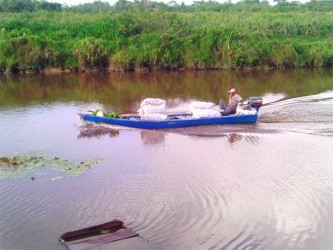
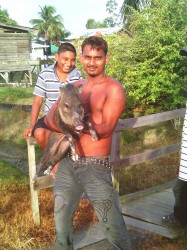
In giving a little more history of the village, Archie said that the community was not so developed as it is today. He said that there was no road or access to potable water. As such residents made use of water from the various ponds and creeks. Archie said that water from these sources was used for drinking and people “din know about bleach and so.”
St Lawrence is accessed by road and by boat, and the inhabitants are polite people, residents said. Previously, farming was the predominant occupation of most persons in the village, Archie explained, but right now the logging industry has overtaken it with a number of sawmills in the community that create employment for most people.
According to Archie, the logging industry gave the community a boost. He is a former teacher but now operates a small gas station in the village. Archie’s familiarity with the village and its operations conveys the impression that he is the village leader, but he is not. He is just a person with a proactive spirit who gets things done whenever the need arises.
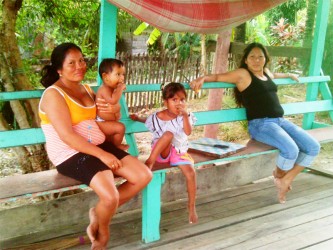
Archie said that he weeds the grass in front of the school and drains the potholes on the road whenever water accumulates in them. He said he does this because the process to get these things done and all the negotiation that is often involved is too time consuming. For him, the time it takes to negotiate can be used in getting the job done.
Archie’s grandson Joshua was at his home when this newspaper spoke with him. For Joshua, his grandparents’ home, located a few blocks away, is the best place for him because he does not get “licks” as often as he gets them at home whenever he does mischief.
For residents minor health needs are catered for at the community health post and the primary and nursery schools provide for the educational needs of children. For kids who are entering secondary school, Parika Secondary is the one which most of them attend. Transportation is not much of a challenge because minibuses traverse the area.
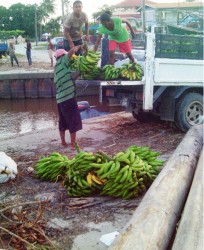
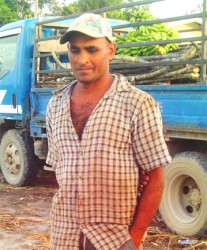
St Lawrence also acts as a port for persons living in the small islands in the river. Residents said that people from these areas would come out at the makeshift landing in the village to access transportation. There is not much to do in St Lawrence. People in the village mostly spend their time at home chatting, or looking at the television.
Meanwhile, farmers in the area travel to a place called High Level where many acres of farming land are available.
Sudesh Nandall has been farming for more than 20 years. He leaves for his farm around 6 am and returns by 5.30 pm evening every day. He said that like him, most farmers travel to their farm on a daily basis as well. This, he said, is a custom that has been handed down for generations.
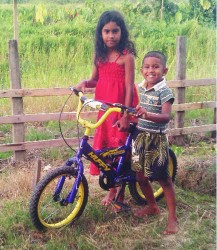
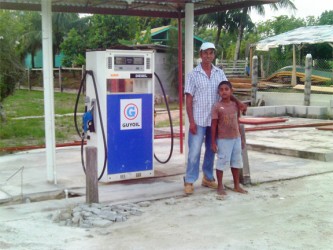
When it’s harvest time, produce is brought out to the waterfront at St Lawrence where a readily available market and wholesale buyers await the farmers. As it pertains to the price of produce, Nandall said that it is not the peak period now, so prices are a bit low but he is still trying. It was noted that the price for produce such as plantains increases from $60 per pound to $200 when it reaches the city.
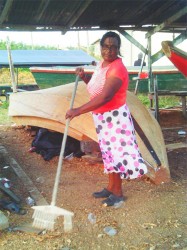
As Archie took us on a tour of the village, Herbert Lackhan, was just about to come out of an alleyway. As Archie said hi and passed, Lackhan was so determined to see what the visit was about that he took his bicycle and rode behind the vehicle.
When he finally caught up with us he could not contain himself from making a contribution to whatever was going on. Lackhan said that he was the person who started a female cricket team in the area. According to him, the team was short lived for various reasons. One of those, he continued, was the presence of boys on the field as the girls were practising.
Lackhan stated that they had agreed that no male should be on the field as the girls were practising but the rule was not obeyed. As males began to visit the field they became indisciplined towards the ladies which resulted in the dropping out of a few and the eventual collapse of the team.
Nevertheless, Lackhan described his village as one with no disturbance and where everyone lived as a family.









